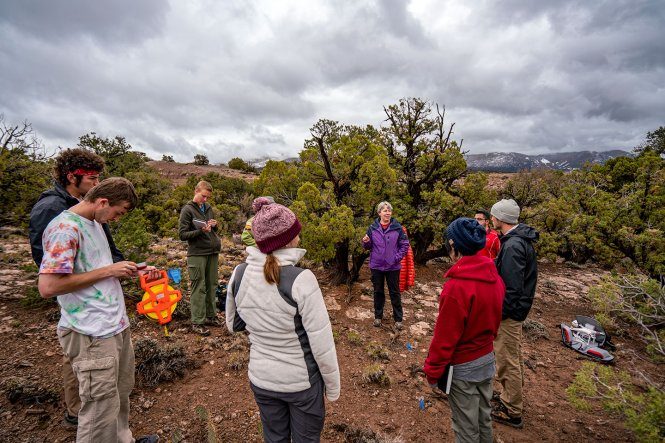By Cole Hatcher
The National Science Foundation is awarding a five-year $499,750 grant to a consortium of ecology researchers led by Ohio Wesleyan University professor Laurel J. Anderson, Ph.D.
The federal grant will support creation of the Macrosystems Ecology For All (MEFA) Research Coordination Network. Macrosystems ecology explores connections among geophysical, biological, and social-cultural processes at different scales (such as how land use by humans in the context of a changing climate affects pollinating insects) and often makes use of large environmental datasets.
In addition to Ohio Wesleyan, the MEFA management team will include researchers from eight other primarily undergraduate colleges throughout the country, said Anderson, Ph.D., OWU’s Morris Family Professor of Natural Sciences.
“MEFA will provide training and support for faculty developing large-scale, coordinated ecological research projects that incorporate multiple colleges,” Anderson said. “The research teams will leverage existing large environmental datasets and integrate DEIJ (Diversity, Equity, Inclusion, and Justice) principles into their work.”
In seeking National Science Foundation (NSF) funding, Anderson and her colleagues outlined the value of creating the MEFA network.
“Through the faculty training provided by MEFA, more undergraduate students will be exposed to emerging data science and macrosystems concepts,” the researchers said. “MEFA will engage faculty from a range of institution types, including community colleges and minority-serving institutions, allowing for diverse student populations to benefit from faculty training.
“Training resources developed by MEFA will be freely available online,” they pledged, “and virtual events will be recorded and archived for future viewing. By providing faculty development in a supportive community of practice, MEFA will enhance the skills of its faculty participants and enable them to build a diverse scientific workforce prepared to engage with the extraordinary environmental challenges of the 21st century.”
As well as serving as MEFA’s principal investigator, Anderson also is president of the Board of Directors for the Ecological Research as Education Network (EREN), a consortium of colleges and universities that she helped to create in 2010. With NSF grant support, EREN was created in recognition that “many of the most pressing questions in ecology and environmental science are best addressed using multiple sites and coordinated data collection,” and it will collaborate with the new MEFA network to advance knowledge.
In addition to Anderson, other researchers and colleges helping to lead the Macrosystems Ecology For All network are Tracy Gartner, Ph.D., of Carthage College in Wisconsin; Matthew Heard, Ph.D., of Belmont University in Tennessee; Kristy Hopfensperger, Ph.D., of Northern Kentucky University; Mary Beth Kolozsvary, Ph.D., of Siena College in New York; Jose-Luis Machado, Ph.D., of Swarthmore College in Pennsylvania; Andrew McCall, Ph.D., of Denison University in Ohio; Timothy McCay, Ph.D., of Colgate University in New York; and Sara Scanga, Ph.D., of Utica College in New York.
A plant ecologist at Ohio Wesleyan, Anderson’s research and teaching interests include temperate forest ecology, invasive plants, global environmental change, and environmental issues in food production, as well as developing collaborative ecological projects across small colleges. She joined the OWU faculty in 2001. Learn more about Anderson and OWU’s Department of Biological Sciences at owu.edu/BiologicalSciences.










